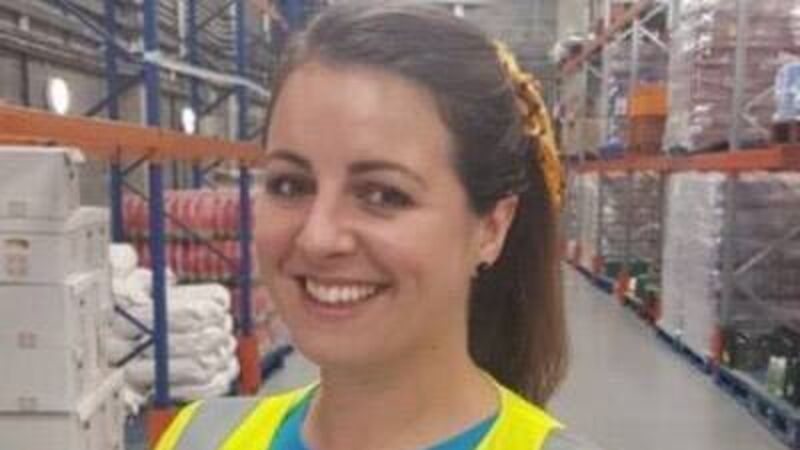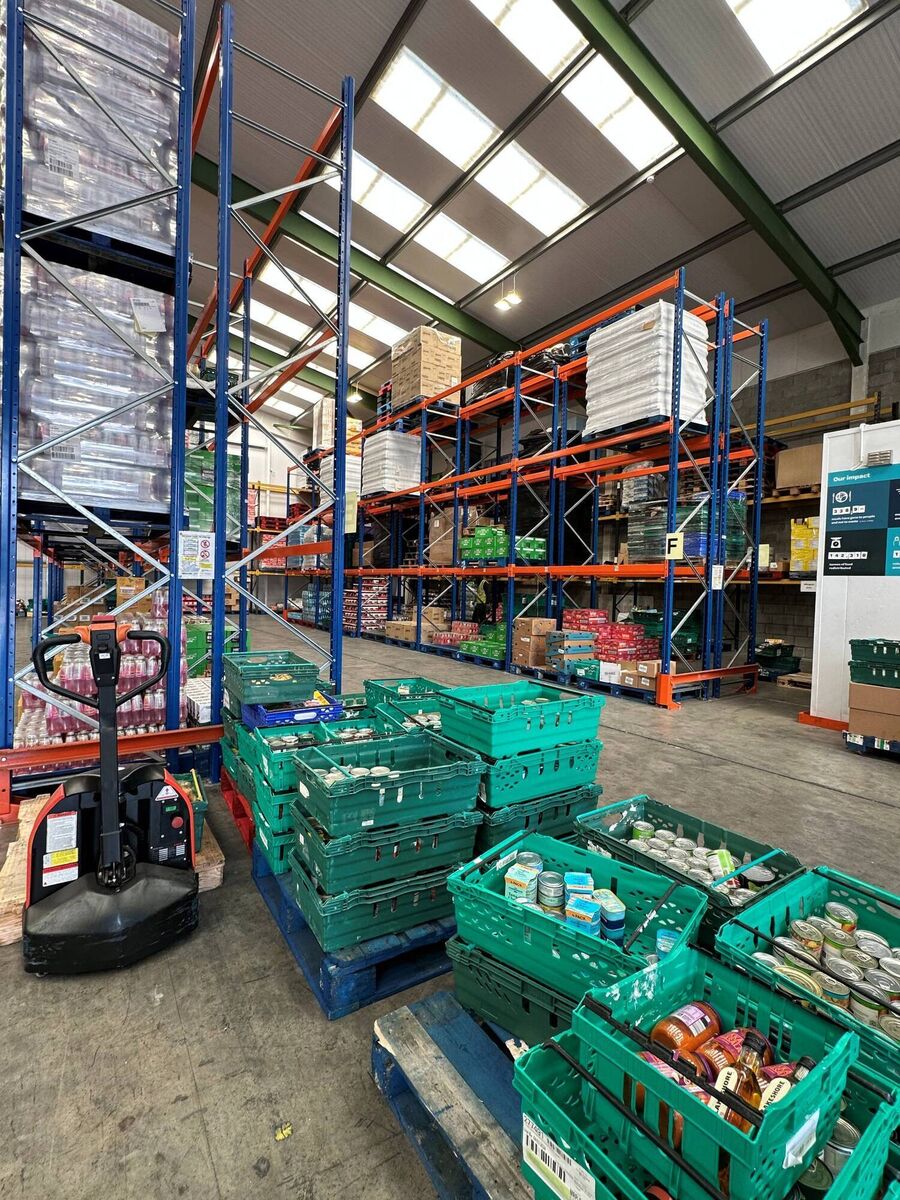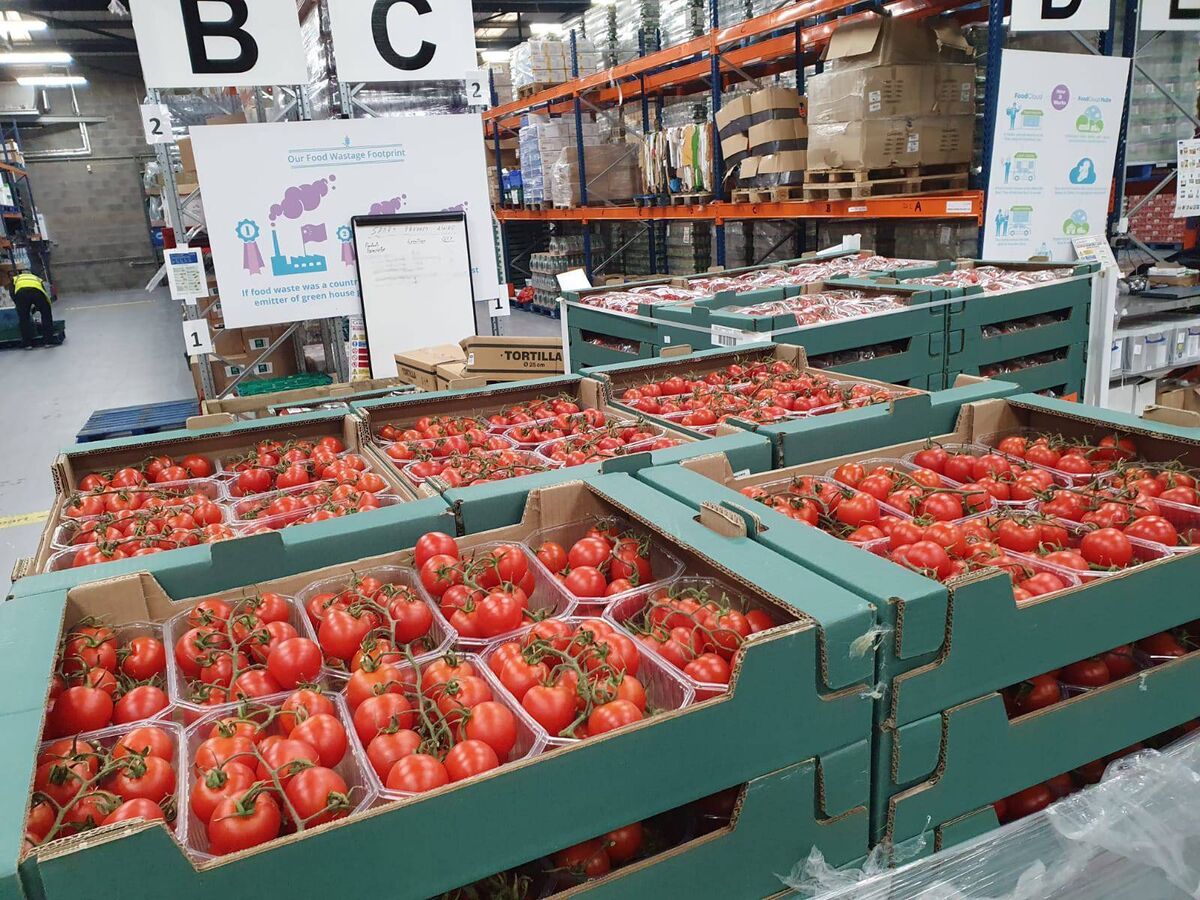Behind the scenes at FoodCloud’s Cork hub

Rosie Fuller is a FoodCloud Account Manager. She explained that seasonality, economics and weather all play a part in what is surplus.
It’s an unassuming warehouse on a Little Island industrial estate, but it’s alive with activity, forklifts, and people in high-vis carrying clipboards. Inside is rack upon rack of food destined for charities that run food banks and community outreach projects.
This is a FoodCloud Food Hub, one of three in the country.
From here, every week 10-15 tonnes of food are redistributed across Munster, equivalent to 30,000 meals for people in need.
Across all three hubs, 40 tonnes of surplus food is redistributed, or 85,000 meals.
By 2030, FoodCloud hopes to have rescued enough food to have provided a billion meals.
FoodCloud was established in 2013 by friends Iseult Ward and Aoibheann O’Brien, a social enterprise aiming to reduce food waste while raising awareness of the food waste problem.
Ensuring no good food goes to waste, FoodCloud connects charities and service providers with retailers and food producers who have surplus food.
Retailers and producers benefit from less food going to landfill, less emissions, and less resource waste all along the food chain.
Charities win because access to heavily subsidised surplus food means funds can be channelled into offering other services that support people in poverty, homelessness and women’s refuges.

Helping people in need is always a worthy pursuit, doing it by redistributing surplus food begs the question: Why is there so much food waste to begin with?
I met Rosie Fuller, FoodCloud Account Manager, to find out how FoodCloud squares the circle.
“Everything is tightly controlled [by retailers] and still we have all this surplus. We’ve never had better technology and a more skilled workforce, but the supply chain is just broken,” says Rosie.
“Seasonality, economics, and weather all play a part in what is surplus. It’s a very dynamic situation. You could nearly guess what time of year it is when you come in here.”
Marketing, product diversification and consumerism all fuel the problem, all of which means there is no one definitive ‘baddie’ that’s the root cause of surplus food.
Being a hub for redistributing food is just the tip of the iceberg of work FoodCloud does.
“We have a Community Development Team who provide support that goes beyond just the provision of food,” says Rosie. “We offer food safety guidance to service providers, support in terms of growing their operations, and how to innovate.”
One such innovation that FoodCloud has supported is the establishment of a social supermarket by Feed Cork.
A Cork hub member for nearly eight years, their work supports 110 families each week with food sourced from FoodCloud, equivalent to 1,000 meals per week.
Social supermarkets enable those who would like to pay something towards their groceries. €7 will provide a person with three to four bags of goods, and €10 will provide enough food for a family. Supporting those who can contribute provides a sense of dignity; removing the stigma, as a Feed Cork volunteer put it, felt by those relying on food banks to eat.
“FoodCloud is there to support innovation and ideas in providing a safe space to give their food out to service users, or find ways to make food go further and last longer - whether that’s food parcels, providing meals, or teaching people how to cook. There’s lots of ways we can support charities to grow with purpose.”
Where does the surplus food come from?
“FoodCloud has 186 food donors supplying surplus food across the three hubs,” explains Rosie.
“In Cork, key donors are BWG, Musgraves, Barry Group, Tesco, Dunnes and Keepak Meats.”
You don’t have to be a huge operator to be a donor. Midleton-based Green Saffron recently joined the donor network, and twice a year West Cork Eggs donates small pullet eggs from young hens that supermarkets won’t accept.
FoodCloud carries several larder essentials.
“We have a good range of chilled, frozen, fruit, veg, and ambient products (soft drinks, sauces, tea, coffee). Our most in demand product would be meat and fish.
“We get a lot of frozen fish, and we have an important partnership with Bord Iascaigh Mhara (BIM). They run a fish filleting course, and we send our van to Ballycotton to collect fresh mackerel, salmon, hake. They might be cut a little wonky, but otherwise it’s perfect. We freeze it and offer it to our charities. We’re very proud of that partnership, to be able to offer fresh Irish fish.”
One challenge in food redistribution is sourcing good, nutritious foods such as vegetables. There are only 33 vegetable producers left in Ireland registered with Bord Bia, and it is widely accepted that the figure will keep decreasing.
What will be the impact on FoodCloud’s service if access to Irish-grown produce dwindles?
“The big challenge for us is providing an array of nutritious food of high quality that’s sustainable, meaning we can provide it over a long period of time to a lot of people,” says Rosie.

“We rely on a lot of different stakeholders. We try and have as many donors as we can of one product because that spreads our risk. But that’s not possible, especially for veg.
“A lot of the veg we get from retail is imported, and that depends on seasonality. We’ll accept all we can get with open arms, but how can we support Irish-grown first? That’s the challenge.”
FoodCloud’s Growers’ Project was piloted in 2022 with support from the government and Tesco, with 30 tonnes of fresh produce redistributed that year.
“The Growers Project is beneficial in supporting farmers in horticulture growing a range of nutritious food. Veg has a very short turn- around which is tricky, but charities are unbelievably good at using veg in loads of different ways. They’re getting small amounts, don’t know what it’s going to be, and FoodCloud is their provider. Chances are they’ll be able to work with anything. They’re more dynamic than a chef used to ordering from a large food-service provider.”
As well as supporting their charities to innovate their service, FoodCloud has also invested in their own innovation.
FoodCloud Academy is the educational pillar open to everyone from home cooks to charities to professional chefs. Some training is delivered via online tutorials, while some professional chefs use the academy to train or workshop food waste reduction ideas.
“It’s a huge support for charities in terms of getting accreditations,” says Rosie. “They can hold workshops where they have their own voice, do practical training, or problem solve as a team. Everyone works in their own silo, so it’s good to get heads together. The Academy gives space to do that.”
Just because FoodCloud is in the business of food waste doesn’t mean they don’t face the same food waste challenges as their donors. Gluts of one kind of product can be problematic, especially when it’s fresh food. The solution is FoodCloud Kitchen, the catering arm of the organisation, sponsored by AIB and supported with a corporate volunteer programme.
Chefs use surplus food from redistribution hubs to create dishes and menus for event catering and their food truck. It also provides prepared and ready-to-eat foods for charities and community projects who may not have resources, skills or time to create nutritious meals for their service users.
“FoodCloud Kitchen was an innovation brought about by need,” explains Rosie. “Charities were taking food from us but then had to produce meals themselves. We wanted to make that easier for them, so we created meals out of our own surplus. That reduces our waste and gives a product they can use much faster.”
FoodCloud’s Academy and Kitchen, while building on doing more with waste, doesn’t yet seem to square the circle of what happens to FoodCloud if food waste decreases over time, as with surplus vegetables.
“The level of food waste is decreasing, just not fast enough; not even hitting government-led targets. The innovations are still required but the amount of food wasted hopefully will decrease in tandem with the more innovation we do.”
In short, FoodCloud needs surplus to make the Hubs, Academy and Kitchen all happen, but they also need to manage and decrease the amount of food wasted.
Into this puzzle comes a FoodCloud innovation with the potential to create an enduring legacy: Foodiverse.
Foodiverse is an app designed to cut out the middle-man and directly connect those who have surplus food with those who need it. “Foodiverse gives people data they can use to reduce their food waste and drives decision making,” says Rosie.
What makes it particularly transformative is its potential to be used in any country in the world.
“We have a lot of support from the government and FoodCloud is a key player in terms of reaching our national climate targets. We work with the Departments of Social Protection, Agriculture, Circular Economy and Foreign Affairs.”
The latter has been running The Kenya Project, which uses Foodiverse.
“The app is being used in Nairobi, Kenya, mostly to redistribute beans and peas for growers. Any surplus is sent to two charities they work with, and it’s growing,” says Rosie.
“Food banking came first so in theory Foodiverse can be used by every food bank in the world. It connects food businesses all along the supply chain with community groups and supports food banks to be more efficient in traceability and provides strong metrics in real time.”
Foodiverse is free to use by charities and those looking to access surplus food. FoodCloud creates a profile for users based on where they are, what they need, and when food can be collected. For example, a charity in Carrigaline can collect surplus food from their local Lidl as many times as there is availability.
“It’s based on where charities are, and it’s FoodCloud’s job to manage the schedule for retailers who pay us to use Foodiverse. The technology layers timetables of what food is available when, and which charities are available to collect, and works out scheduling and notifications.”
Other functions include ‘sweeping’ which allows for uncollected food assigned to one collector to be redistributed to other service users in the same area.
The app is an important legacy innovation for FoodCloud because it creates revenue and ultimately a pathway for a sustainable, viable future for the organisation; squaring that circle.
Although FoodCloud’s own research shows the rate of waste is declining, vast amounts of surplus food remain unclaimed.
FoodCloud is drowning in yogurt yet struggles to source fresh milk.
“When we ask how to engage donors, the biggest challenge is risk to reputation. Even though it’s a good thing to give [milk] to charity as opposed to wasting it, they tell us it’s not great for their reputation to have a relationship with a food redistribution company,” says Rosie.
“Is this a general position co-ops hold? If we were able to ask each farmer, would they rather their food go in the bin or go to somebody in a community so they can have a cup of tea in the evening like they do, they might be minded to say yes to working with us.”
If the food system remains as is, food waste will be a problem that needs a solution. Welcome to the Foodiverse!
Retailers or producers with surplus needing a home, or interested in volunteering at a hub can contact food@foodcloud.ie or visit www.food.cloud. www.foodiverse.net.







 App?
App?


